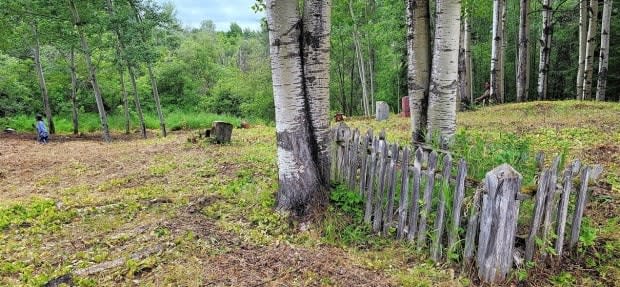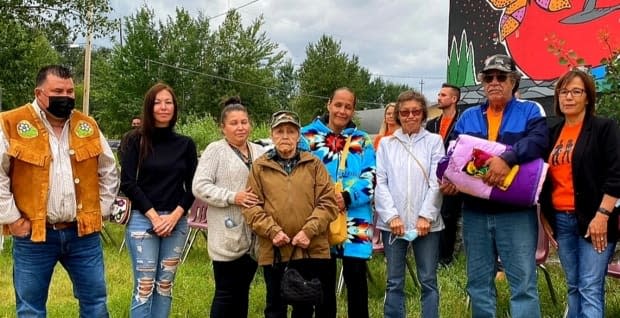Lac La Ronge Indian Band begins search for residential school graves, with 'a lot of work ahead'

WARNING: This story contains distressing details
The Lac La Ronge Indian Band has become the latest First Nation in Saskatchewan to begin searching for unmarked graves associated with a local residential school site.
"We have a lot of work ahead of us," Chief Tammy Cook-Searson said.
The band launched its search efforts on Saturday using ground-penetrating radar equipment at an old cemetery site west of downtown La Ronge, Sask., located approximately 375 kilometres northeast of Saskatoon.
Lac La Ronge Indian Residential School operated on grounds in front of the cemetery site, which also functioned as a community cemetery and today is marked by headstones here and there, Cook-Searson said.
"We don't know who's all buried in the cemetery," she said.
The search comes one week after seven other First Nations launched similar efforts in the community of Delmas, Sask., where the Delmas Indian Residential School once stood.

The work in La Ronge will take time. Only 30 per cent of the cemetery site was explored on the weekend, with elders and other band members sometimes taking the reins of the equipment.
The remaining 70 per cent of the cemetery still needs to be combed, Cook-Searson said.
"And then we also have to do the outside of the cemetery, in the surrounding area, where elders have said that there's a mass grave here … you know, just from oral history and time passing down information," she said.
The band is looking to take up that additional work in late August.
No discussion has taken place about whether to exhume any bodies found in order to aid with identifying remains, Cook-Searson said.

This weekend's launch was a community event, with food and support workers on hand.
In one information tent, band member John A. Irving shared his years of research on the cemetery, including a model he constructed of the former residential school.
"He's working on passing that knowledge down to the younger generation," Cook-Searson said.
La Ronge Mayor Colin Ratushniak and Chief Bobby Cameron of the Federation of Sovereign Indigenous Nations were among the dignitaries present for the search launch.
"I think it went well," Cook-Searson said of the event. "A lot of people came out to support each other. It was difficult work, but it was really important to have all the support there."

The Lac La Ronge Indian Band is the fourth known Indigenous group in Saskatchewan to recently begin searching for unmarked graves associated with a residential school.
The seven First Nations that make up Battlefords Agency Tribal Chiefs have not yet announced results from their recent work in Delmas.
Muskowekwan First Nation has said it had found the remains of 35 previously unidentified students. More work is planned at the Muscowequan residential school site this summer.
Cowessess First Nation announced a preliminary finding of 751 unmarked graves at a cemetery near the former Marieval Indian Residential School — the largest such discovery in Canada to date.
Support is available for anyone affected by their experience at residential schools, and those who are triggered by the latest reports.
A national Indian Residential School Crisis Line has been set up to provide support for former students and those affected. People can access emotional and crisis referral services by calling the 24-hour national crisis line: 1-866-925-4419.
Do you have information about unmarked graves, children who never came home or residential school staff and operations? Email your tips to CBC's new Indigenous-led team investigating residential schools: WhereAreThey@cbc.ca.

